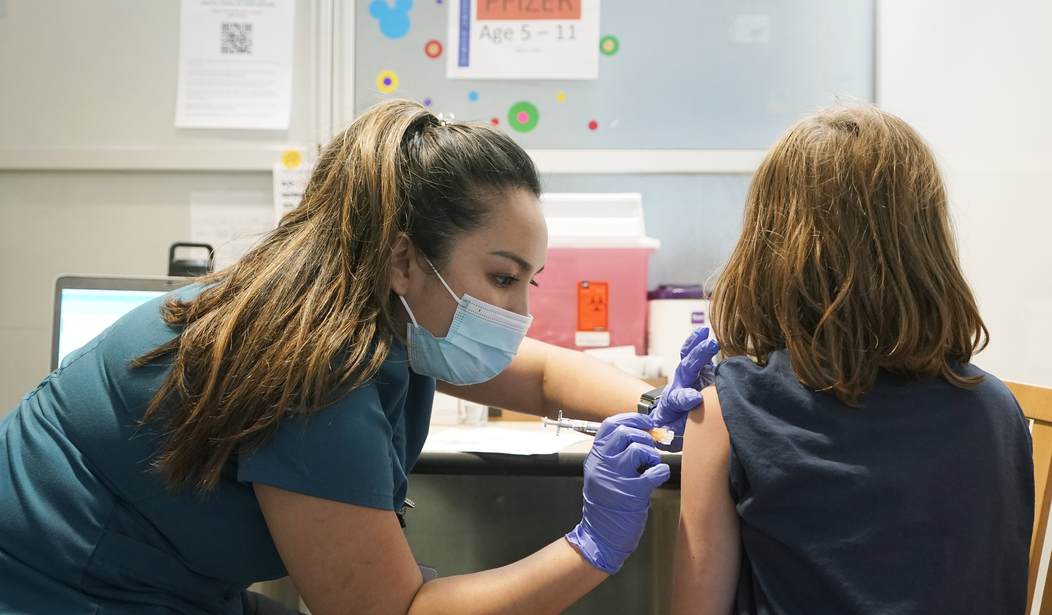Do you remember the good old days when the leading pharmaceutical companies that were producing the vaccines were rushing through their clinical trials at the behest of the federal government and asking for emergency FDA approval of the vaccines for children ages five through twelve? And do you remember how any parents (including the ones who were vaccinated themselves) who were hesitant about having their young children get the shots until there was more data available were pilloried as being anti-vaxxers and “part of the problem?” Ah… good times. Sadly, a new study conducted in New York that measured the efficacy of the Pfizer vaccine in younger children has thrown some cold water on all of the original optimism. It turns out that children in that age group received very little protection from the vaccine, with only 12% developing effective resistance to the omicron variant of the virus. Protection against hospitalization in the group was also slashed to less than half. (CNBC)
Pfizer and BioNTech’s two-dose Covid vaccine provided very little protection for children aged 5 to 11 during the wave of omicron infection in New York, according to a study published Monday.
The New York State Department of Health found that the effectiveness of Pfizer’s vaccine against Covid infection plummeted from 68% to 12% for kids in that age group during the omicron surge from Dec. 13 through Jan 24. Protection against hospitalization dropped from 100% to 48% during the same period.
The study has not yet undergone peer review, the academic gold standard. Due to the public health urgency of the pandemic, scientists have been publishing the results of their studies before such a review.
Katie Pavlich summed it up nicely.
The vilification of parents who were like, “Yeah, we want more data first before giving this to our kid, if we ever do,” is off the charts insane. Same applies for anyone, especially women, who wanted more data first. https://t.co/VSV4dnQw10
— Katie Pavlich (@KatiePavlich) March 1, 2022
We were probably seeing some foreshadowing of these developments when Pfizer postponed their application for emergency FDA approval of vaccines for children under the age of five. Everyone seemed to have been all gung-ho about getting those shots for toddlers out the door, but when the company looked at the results of the initial clinical trials they backpedaled and said that it might be as late as May or June before they would be ready to submit all of their data to the FDA.
We saw what appeared to be a similar pattern when the CDC recently announced that patients should probably wait at least two months between their first and second shots of both the Moderna and Pfizer vaccines, rather than the three or four-week pause that had been recommended from the beginning. All of the lecturing we received about getting both doses as soon as possible and the subsequent warnings we heard about immunity not lasting as long as anticipated seemed to be related.
None of this is to say that the vaccines have suddenly been declared entirely useless. They can still provide a lot of help to the most vulnerable age groups and those with significant comorbidities. But the lessons being learned now suggest that there was a good reason it used to take so long to bring a new vaccine to market and the guidelines for how they are distributed won’t turn out to be the same for every demographic group of patients. The rush to vaccinate increasingly younger children made the least sense in retrospect because they were the least likely to catch or transmit the virus, as well as being the least likely to die or have a significantly detrimental outcome.
As far as the clinical trials go, to their credit, the pharmaceutical companies did seem to quickly establish the overall safety of the vaccines as well as the rarity of most of the more severe side effects. And the fact that they were delivering some level of immunity for the vast majority of people also seems to have been confirmed. But the details matter, as we’ve been learning this year. And the people doing all of the aforementioned lecturing probably shouldn’t have been so rock-solid positive about the information they were spewing before all of the testing was complete. And that’s a process that probably won’t be finished for a couple more years.








Join the conversation as a VIP Member